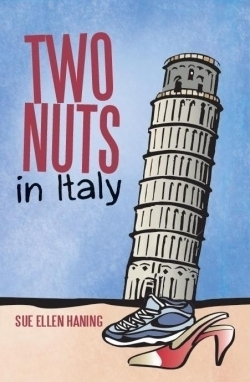
Two Nuts in Italy
Two Nuts in Italy is not your typical tale of a backpacker’s trip through Italy. No, this novel is the travel memoir of a fifty-six-year-old woman flying in the face of incredulous, discouraging friends by accepting her twenty-one-year-old daughter’s invitation to spend a summer with her backpacking through Italy as they rely solely on the kindness of strangers for a roof over their heads.
The first chapters throw us straight into author Sue Ellen Haning’s head as she tries to decide if she should go. She finds herself torn between the advice of friends who proclaim she is not only too old, but a complete nut to consider the trip to Italy, and persuading herself that this adventure is something that she craves, desires and needs.
The author humorously addresses the age difference between herself and the average backpacker. Even the definition of “essentials” comes into question. To daughter Jenny, essentials mean a hair dryer and high heels, while the author is packing vitamins and inhalers. The opening chapters also deal with a change in plans as her son Jake joins the trip.
Haning recounts the whirlwind of their first days in Italy—of trying to absorb Italian culture while overcoming jet lag and settling into her new situation and location complete with heat, discomfort and bugs. As the journey continues, Haning undergoes a transformation. There is a growing connection between the author and her location as she becomes immersed in Italian culture and her communication and movement become more fluid. Her descriptions are richer, her writing more sensual as she shares descriptions and details of food, markets, the landscape and people.
The author portrays every up and down, from the animated Italian characters who show them the sights or host them for a time, to the diversity of backpackers that they meet and disappointments and fears of having no place (or a somewhat squalid place) to stay. They find themselves at various times broke, hungry or discriminated against because George Bush is president back home.
The author’s observations of the culture are candid and comical. Of the Italians, she notes, “It’s fascinating how Italian cars drive themselves. I count, and Nic touches the steering wheel six times. These are times someone else is talking, and he doesn’t need his hands.”
Americans are not immune from her observations. At a college graduation party, Haning is “blown away” by conversations on history and politics she has with students from around the world and notes: “These 20-year-olds have a much different outlook on life than American college students.” In another instance, sitting with a woman and cracking open sections of pine cones to harvest the nuts inside, the author observes: “It’s amazing how much time Italians spend with their friends and neighbors daily. They are rich in a way that we are poor. We live sterile lives, ceaselessly racing ahead of ourselves toward progress and achieving bigger and better goals … Our compassion comes through our pockets. We as individuals are happy to share our money, but we don’t share ourselves, like I see Italians doing.”
These observations occur more frequently as the author continues on her journey through Italy and into her own identity. Haning returns to America after the three months abroad realizing that her spirit is “violated” by the surroundings that were once familiar and comforting: “I understand that different is not always better, but differences open eyes. I am seeing things differently. In Italy, I came in contact with the far side of me. My spirit experienced a rebirth, and I learned to let it soar. I unearthed my passion and decided to let it live.”
Two Nuts in Italy is about a woman who challenges her apprehensions and stereotypes about the limits of so-called older women. It is a story of travel and transformation. Besides discovering a new world, the author rediscovers herself. Recommended reading, especially for the “mature” woman.
Reviewed by
Maya Fleischmann
Disclosure: This article is not an endorsement, but a review. The publisher of this book provided free copies of the book and paid a small fee to have their book reviewed by a professional reviewer. Foreword Reviews and Clarion Reviews make no guarantee that the publisher will receive a positive review. Foreword Magazine, Inc. is disclosing this in accordance with the Federal Trade Commission’s 16 CFR, Part 255.
